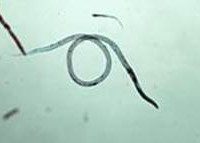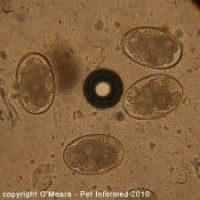WORMS AND GERMS!
Have you ever wondered?
What kind of intestinal parasites could my pet get?
How does my pet get intestinal parasites?
Does my pet have intestinal parasites?
Could I get these parasites from my pet?
How can I prevent my pet from intestinal parasites?


Now that we know some of the different kinds of parasites out there, how could your pet get them? Depending on the parasite they can be transmitted through the mammary glands while puppies or kittens are nursing, coming into contact with infected fecal (poop) samples, digging around in the dirt or drinking contaminated water. Hookworms can even burrow through the skin. The environment is contaminated from the feces of pet dogs and cats but wildlife can carry many of these parasites as well.
There are a few ways to find out if your pet has intestinal parasites. For some of the intestinal worms you may see them in the poop from your pet (tapeworms and sometimes Roundworms). Another way is bringing in a poop sample to your veterinary clinic and we them look at the sample under a microscope. This test is only to check for eggs the worms lay not the worms themselves most of the time. We recommend checking 2 poop samples a year to have a better chance of seeing parasite eggs if they are positive. Remember, parasites don’t produce eggs 24 hours a day 7 days a week – so a negative sample with no eggs does NOT guarantee any infection. A poop sample the next day could actually be positive! When we are dealing with a pet that is sick or has diarrhea we will sometimes check 3 poop samples in a row to increase the chance of finding a parasite. For Giardia there is also what is called a Snap test that will show positive or negative in the poop sample. This test actually is testing for proteins on the surface of the giardia parasite.
What you see…

What we see…


With all of the intestinal parasites that are out that are zoonotic; meaning that they go from animals to people, people have to be vigilant! Here are a few ways to prevent the transmission of these intestinal parasites:
- Making sure to wash your hands after cleaning the litter box or picking up poop or even gardening – these areas are often contaminated!
- Making sure to pick up after your pet to limit exposure of infected poop and to reduce the contamination in the environment (protect you and your neighbors)
- Watch your children closely when playing in sandboxes (some animals think it is just a really big litter box) and wash hands carefully when done.
- ALWAYS wash your hands before you eat!!!!
The next step is to help prevent your pet from getting these intestinal parasites. Make sure to
check a poop sample at least twice a year. Also using preventatives like Heartgard Plus that treat and control 2 types of roundworms and 3 types of hookworms in dogs and 2 types of hookworms in cats. If you live in an area that is more prone to intestinal parasites, if your pet spends a lot of time outside on their own, or if your pet hunts rodents, regular deworming will help control these parasites.
For more information about Intestinal Parasites you can go to these really good websites:












